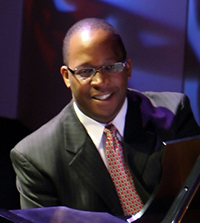Special Reports
MA Top 30 Professional: Howard Watkins

Assistant Conductor, Metropolitan Opera
Vocal Arts Faculty, The Juilliard School
Graduate Vocal Arts Faculty, Bard College Conservatory of Music
Howard Watkins is used to working behind the scenes at the Metropolitan Opera as an assistant conductor, whose job is to assist in the musical preparation of productions, which primarily entails coaching singers. He plays piano for rehearsals and sometimes as part of the Met orchestra. But when the company shut down during the pandemic, Watkins branched out into the spotlight to celebrate music of Black composers and singers, a mission that has continued for him.
“It’s terrible that the pandemic happened, but it gave me the pause I needed to be able to explore this music,” said Watkins, who has been on the Met’s music staff since 1998. “If I had kept going in my usual pattern of doing shows, I wouldn’t have had the time, or it wouldn’t have come to my attention, to dig into this repertory and be on the front line of getting it out there.”
In the wake of the police killing of George Floyd and the Black Lives Matter movement, Watkins was closely involved in curating and playing in some top-flight programs. They included a concert of works setting the poetry of Langston Hughes by Black composers Margaret Bonds, Florence Price, George Walker, Robert Owens, and others, at Hamburg’s Elbphilharmonie; and a recital of Bonds art songs with bass-baritone Timothy Jones that was livestreamed from the Rienzi house museum in Houston.
For Tulsa Opera, Watkins co-curated and played in Greenwood Overcomes, a concert marking the centennial of the 1921 race massacre in a Tulsa neighborhood called “Black Wall Street.” Heard in a national radio broadcast in June, the program featured Denyce Graves, Davóne Tines, and six other leading Black singers in works by 23 living Black composers, including Carlos Simon, Tyshawn Sorey, Nkeiru Okoye, Tania León, and David Bontemps.
“The idea was not to look back in anger but to express the wonderful things possible from Black composers, Black singers, Black culture,” Watkins said. “I liked the positive, hope-filled approach that it represented.”





 FEATURED JOBS
FEATURED JOBS

 RENT A PHOTO
RENT A PHOTO


